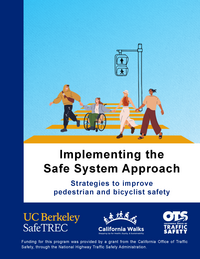The Community Pedestrian and Bicycle Safety Training (CPBST) program is a joint project of UC Berkeley SafeTREC (SafeTREC) and California Walks (Cal Walks). The Community Pedestrian and Bicycle Safety Training Program (CPBST) works with local residents, agency and organization staff, and transportation safety advocates to understand a community’s walking and biking safety concerns and advance their pedestrian and bicycle safety goals. We work to strengthen collaboration between all safety partners, discuss transportation safety information and local crash data, and collectively develop a community-driven safety action plan. Our team works with a local Planning Committee to customize the workshop to fit the unique needs of each community.
The CPBST is jointly planned with a local Planning Committee of community leaders, residents, schools, agencies and other safety partners over the course of two to three months. During the workshop, the Project Team reviews local crash data and the community’s traffic safety experiences, reviews an adapted Safe System approach framework and pedestrian and bicycle safety best practices, guides participants on a walking and biking safety assessment, and helps participants identify actionable next steps.
The program began in 2009 as the Community Pedestrian Safety Training (CPST) program. In 2016 it was expanded to incorporate strategies to improve bicycle safety and renamed the Community Pedestrian and Bicycle Safety Training (CPBST) program.
2026 CPBST trainings
Applications are now closed for the 2026 CPBST. The program will partner with communities throughout California to discuss, plan, and implement active transportation safety improvements. Reach out with any questions about the process to our team at cpbsp@berkeley.edu
Learn more:
Download and review the 2026 CPBSP flier: English / Spanish
Follow-up support
Has your community hosted either a CPBST or CAyS workshop and would like more support? We offer follow-up technical assistance for former CPBST and CAyS communities to support their community’s implementation of programs, projects, and recommendations outlined in their community action plan. To inquire about follow-up technical assistance, please contact us at cpbsp@berkeley.edu
Our past work
As of 2025, SafeTREC and Cal Walks have conducted 155 pedestrian and bicycle safety trainings throughout California. Explore our interactive map of the Community Pedestrian and Bicycle Safety Program (CPBSP) or our web accessible, text version page to view summary reports, where available, of each workshop proceeding, including ideas identified during the process and recommendations for pedestrian/bicycle safety projects, policies, and programs.






